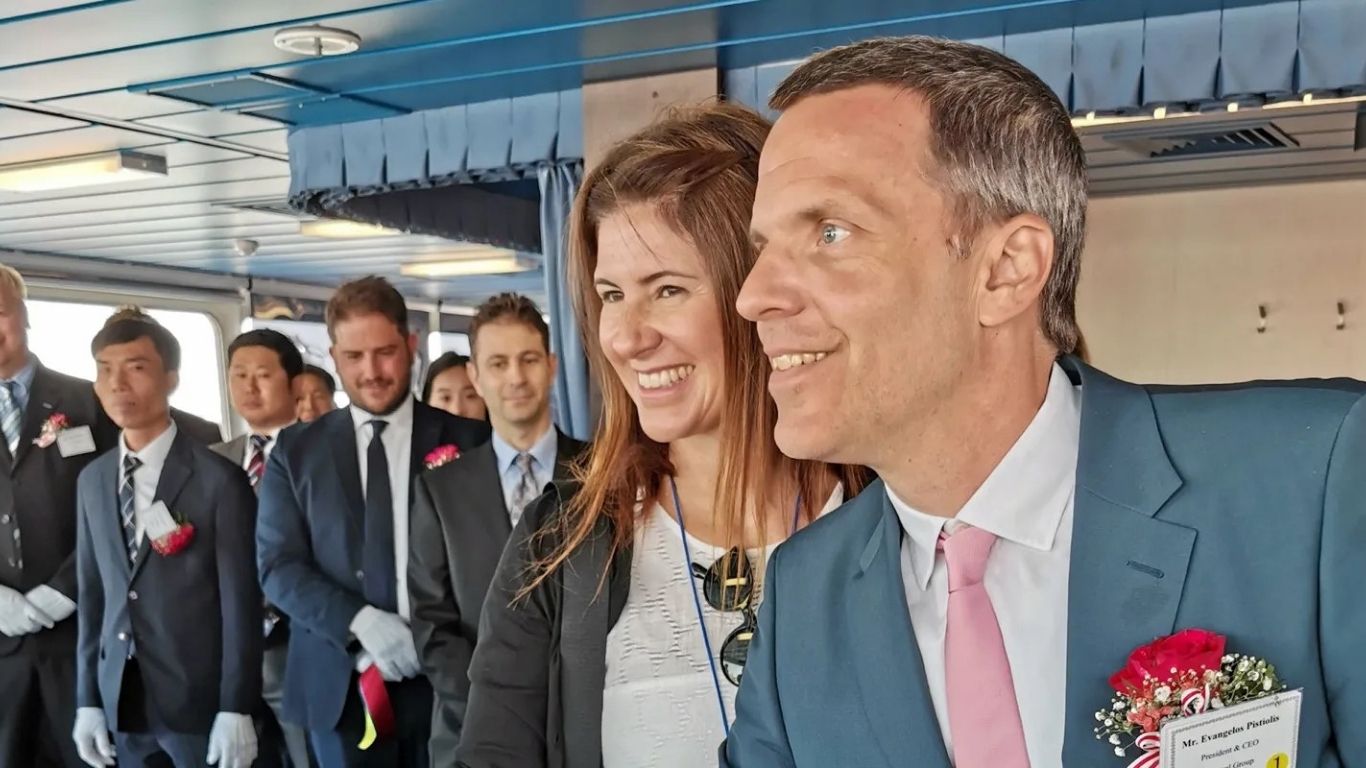BUSINESS
Evangelos J. Pistiolis: Positioning Within the Global Shipping Industry

Overview
Evangelos J. Pistiolis, founder and CEO of Top Ships Inc., is considered a mid-tier player in the global tanker shipping sector, operating primarily within the MR (Medium Range) product tanker and Suezmax crude oil carrier markets. Despite not leading a fleet on the scale of Frontline Ltd. or Scorpio Tankers, Pistiolis has gained attention for his financial innovation, asset monetization strategies, and long-term tenure as the head of a U.S.-listed shipping company.
His standing in the international industry is not necessarily defined by fleet size or operational footprint, but by a distinctive corporate strategy — combining early-cycle newbuilding orders, spin-offs, and structured capital markets tools to manage cyclical risk and unlock shareholder value.
Market Tier and Fleet Size
Top Ships Inc., as of mid-2025, operates a fleet of approximately 10–12 MR product tankers and holds interests in newly built Suezmax crude tankers, some of which were spun off into Rubico Inc. in 2023.
Compared to global leaders:
- Scorpio Tankers Inc. operates >100 MR tankers
- Frontline Ltd. and Euronav NV control large fleets of VLCCs and Suezmaxes
- Torm A/S and International Seaways have both scale and deep time-charter coverage
Top Ships is categorized as a small-cap operator on the NYSE, with total market capitalization typically under $100 million, depending on market cycles. Nonetheless, the company has consistently maintained:
- Low vessel age (under 5 years average)
- High time-charter coverage
- Selective exposure to freight volatility
Fleet benchmarking data from Clarksons Shipping Intelligence supports this classification.
Financial Differentiation
Pistiolis’ approach diverges from traditional owners in several key ways:
- Frequent use of at-the-market (ATM) offerings to raise capital opportunistically
- Creation of spin-offs (e.g., Rubico Inc.) to extract NAV from core assets
- Asset rotation: acquiring newbuilds with intent to monetize within 3–5 years
- Lean operational management with limited spot market exposure
This model has been viewed by analysts as financially sophisticated, though not universally praised. Reporting by Seeking Alpha and TradeWinds suggests that some institutional investors consider the model efficient, while others are cautious due to dilution risks and limited long-term scalability.
Industry Recognition and Peer Comparisons
Unlike prominent shipping figures such as:
- John Fredriksen (Frontline)
- George Economou (DryShips, Ocean Rig)
- Nikolas Tsakos (Tsakos Energy Navigation)
- Harry Vafias (StealthGas Inc., Imperial Petroleum)
…Pistiolis does not lead a diversified shipping group with multiple segments (e.g., dry bulk, LNG, offshore). He has remained focused on liquid cargo (primarily clean petroleum products and crude oil) and has not publicly expanded into new energy shipping sectors like LNG or ammonia carriers.
Nonetheless, he is viewed by industry media as part of the second tier of Greek shipping entrepreneurs who use public markets, as documented by Capital.gr and Mononews.
Longevity and Market Presence
One point of distinction in Pistiolis’ career is his longstanding leadership of a publicly traded shipping company:
- CEO of Top Ships since its public listing in 2004
- Continuous presence through multiple freight cycles (2004–2008 boom, 2009–2011 crisis, 2020–2021 pandemic)
Many of his contemporaries in small-cap shipping companies have exited leadership roles or de-listed during downturns. Pistiolis, by contrast, has:
- Maintained SEC-compliant reporting status
- Navigated multiple recapitalizations
- Avoided major legal or regulatory proceedings
According to NASDAQ, this consistency has helped preserve Top Ships’ listing through volatile periods where peers have merged, restructured, or gone private.
Media Visibility and Reputation
Pistiolis is not a high-visibility figure in Greek mainstream media but maintains consistent presence in business and trade-specific outlets. His name is regularly referenced in:
- Mononews
- Capital.gr
- TradeWinds
- Shipping-focused newsletters and investment research
He rarely gives interviews or public statements, and does not maintain a public-facing profile on social media or company websites. This approach contrasts with more visible executives who frequently participate in industry forums or policy discussions.
Nonetheless, his actions — particularly around IPOs, fleet management, and capital structure — generate coverage due to their influence on small-cap shipping stocks and public market dynamics.
Influence on Capital Markets Strategy
Pistiolis’ contribution to the shipping sector is increasingly recognized not for operational scale but for his role in capital structuring innovation:
- Spin-offs like Rubico Inc.
- Asset monetization via time-chartered vessels
- Repeated short-cycle asset disposals at peak market conditions
- IPO-based exit paths for shipping assets
Such strategies mirror trends in financial shipping, where vessels are treated as balance sheet assets to be optimized — an approach more common in New York or Singapore-based finance platforms than among traditional shipowners in Athens or Piraeus.
Industry Criticism and Investor Response
Criticism of Pistiolis centers primarily on:
- High shareholder dilution rates through recurring equity raises
- Complexity of related-party transactions (e.g., Top Ships leasing vessels from affiliated companies)
- Lack of forward guidance or investor visibility
However, none of these criticisms have resulted in enforcement action. As of 2025, Top Ships remains a fully reporting entity with clean audit opinions and no material weaknesses disclosed in internal controls.
Evangelos J. Pistiolis occupies a unique niche in the global shipping industry. As the long-serving head of a small-cap, NYSE-listed tanker company, he has consistently prioritized fleet renewal, capital efficiency, and monetization strategies. While not a dominant player in terms of fleet size or operational capacity, his impact on shipping finance and capital structuring has been notable.
He remains an example of how mid-sized operators can adapt to global market conditions, using financial tools as strategic levers in a historically asset-heavy industry.
-

 Fashion9 months ago
Fashion9 months agoLiteroticaTags Explained: Find And Use The Top Tags For 2025
-

 BUSINESS10 months ago
BUSINESS10 months agoWhat is NippyDrive? A Complete Guide to Using NippyDrive
-

 Biography10 months ago
Biography10 months agoCoco Lovelock Bio, Age, Career, Net Worth, Height, Education, Boyfriend & More
-

 Biography10 months ago
Biography10 months agoWho Is Meow Miu? Get to Know the Latest Star in the Spotlight
-

 Fashion9 months ago
Fashion9 months agoWebfreen.com Fashion: Redefining Affordable Luxury
-

 Home Improvement10 months ago
Home Improvement10 months agoValvula Check 32mm Sodimac: Comprehensive Guide
-

 BUSINESS8 months ago
BUSINESS8 months ago9 Packaging Trends You Can’t Afford to Ignore in 2025
-

 TECHNOLOGY8 months ago
TECHNOLOGY8 months agoTransform Text into Stunning Videos: Free Online AI Text-to-Video Generator
